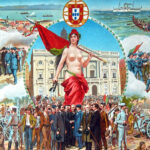By James Plaskitt
Elections for local councils will be held on 26 September. The electoral system used here in Portugal is a proportional list, so there is no voting for a named individual as your councillor. Instead, you select a party list, and council seats are allocated according to how well the lists do. The lead candidate of the winning list will become the new mayor.
So, if you have managed to register, and wish to exercise your democratic rights, here is a brief guide to the parties who are expected to present lists in the western Algarve.
We will start with the two main parties.
PS PARTIDO SOCIALISTA The Socialists are the dominant party at present in local politics in our area, and are also in government nationally. The party is similar in its philosophy to the UK Labour Party or the German SDP. It declares that ‘solidarity and tolerance are essential pillars of life in a developed society.’ It was founded at the time of the 1974 revolution and has been a dominant force in Portuguese politics ever since, having eight spells in government so far, including the present administration headed by Antonio Costa. A former Socialist PM, Antonio Guterres, is now Secretary General of the United Nations. See ps.pt
PSD PARTIDO SOCIAL DEMOCRATA A slightly confusing name for some, because although it suggests this could be a moderate left party, it is actually centre-right. At the time of its founding, just after the revolution, it was thought essential to have a leftsounding name to stand any chance. The party is quite a broad church, including conservatives and classic liberals. It argues for lower taxes and more devolved power. Since the revolution, it has alternated in government with the PS. See psd.pt
Then we have the remaining contenders – all of whom have some representation currently in the national Parliament.
BE BLOCO DE ESQUERDA The ‘Left Bloc’ was created in 1999 by the merger of three hard left parties – Popular Democratic Union, Revolutionary Socialist Party and Politics 21, all communist in one form or another. The bloc declares its purpose is to support ‘humanity’s emancipatory struggle against oppression.’ It declares itself to be strongly anti-discrimination. Seen as a progressive alternative to the Portuguese Communist Party, it lent Parliamentary support to the minority Socialist government from 2015-19. See bloco.org
PCP PARTIDO COMUNISTA PORTUGUÊS The PCP is celebrating its centenary, and is the grandfather of Portugal’s current political parties. It was influential in the immediate aftermath of the revolution, but has declined since. It is anti-EU, backs nationalisation and declared the recent NATO summit as a gathering of ‘imperialist warmongering powers’. It declares itself ‘for social transformation and the defeat of capitalism through revolutionary means.’ See pcp.pt
PEV PARTIDO ECOLOGISTA OS VERDES In other words, the Greens. Founded in 1982, it declares itself ‘in defence of life, peace, nature and the environment.’ It also has the ambition to be ‘a left wing force in local power’. See osverdes.pt
To add to the mix, the Communists and the Greens do not appear as separate lists in local elections. Instead, they run a combined list called CDU – COLIGACAO DEMOCRÁTICA UNITÁRIA. This is sometimes referred to as the watermelon coalition – green on the outside and red in the middle.
PAN PESSOAS ANIMAIS NATUREZA For people, animals and nature, this new progressive party was formed in 2009 and advocates the recognition of animal sentience. It calls for a universal basic income and strongly opposes bullfighting. It is proecology. See pan.com.pt
CDS-PP CENTRO DEMOCRÁTICO E SOCIAL – PARTIDO POPULAR This is a Christian-Democrat style conservative party, sitting firmly on the right of the spectrum, and is certainly more conservative than the PSD. It is eurosceptic, anti-abortion and calls for lower taxes. See cds.pt
CH CHEGA ‘Enough’ is new on the scene, founded in 2019. It is hard right, nationalist, socially conservative, anti-EU, anti-immigration and pro-death penalty. See partidochega.pt
IL INICIATIVA LIBERAL Another option on the hard right, founded in 2016, the Liberal Initiative stands for individual freedom, opposes state power and calls for a flat income tax of 15%. See iniciativaliberal.pt
So you should have plenty of choice. All the parties are likely to put more information about the local election policies on their websites and many of the lists will distribute local leaflets introducing members of their list and outlining key policies.
This guide is by no means exhaustive. There are 14 more registered political parties in Portugal, but most are unlikely to field lists in this month’s local elections.
The voter registration process has not been entirely straightforward post-Brexit and the list is now closed. So if you have navigated the system successfully and secured yourself a vote, now is the time to use it.
James Plaskitt is a retired politician who was a member of the British Parliament FROM 1997 until 2010. He now lives in the Algarve.













